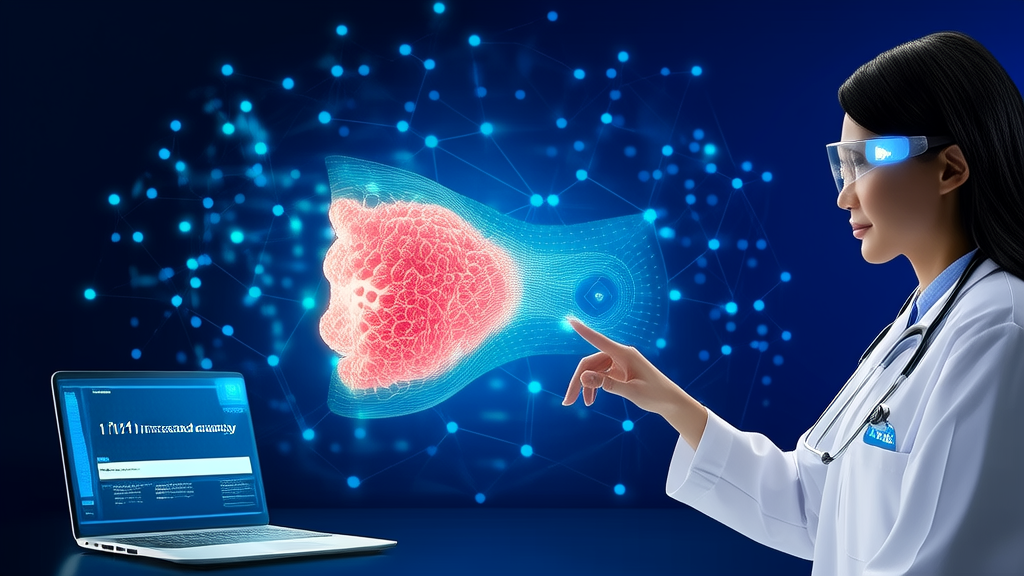🧠 Daily AI & Tech Trends
AI Saves Lives: Google Health's Tool Detects Breast Cancer 11.2% More Accurately

AI in Action: Transforming Industries and Everyday Life
As we continue to witness the rapid evolution of artificial intelligence, it's clear that AI is no longer just a futuristic concept. It's here, and it's making a tangible impact on our lives. From revolutionizing healthcare to enhancing consumer experiences, AI is transforming industries and creating new opportunities. In this post, we'll explore some of the most compelling real-world applications of AI, with a focus on practical implications and human interest angles.
AI in Healthcare: Saving Lives and Improving Patient Care
The integration of AI in healthcare has been nothing short of transformative. One of the most significant developments is the use of AI in early disease detection. For instance, Google Health has developed an AI-powered tool that can detect breast cancer up to 11.2% more accurately than traditional methods. This means that thousands of women could receive earlier and more effective treatment, potentially saving lives.
Another example is the work being done by Babylon Health, which uses AI to provide virtual consultations and triage patients. Their chatbot, powered by natural language processing (NLP), can diagnose common conditions and recommend appropriate next steps. This not only improves access to healthcare but also reduces the burden on overworked medical professionals.
Practical Impact: AI in healthcare is improving diagnostic accuracy, reducing wait times, and providing more personalized care. These advancements are particularly crucial in underserved areas where access to medical expertise is limited.
Future Implications: As AI continues to evolve, we can expect even more sophisticated tools that can predict and prevent diseases, leading to a healthier and more resilient population.
AI in Retail: Personalized Shopping Experiences
The retail industry is leveraging AI to create more personalized and efficient shopping experiences. Amazon Go stores, for example, use computer vision and sensor fusion to allow customers to shop without ever having to stand in line or check out. The technology automatically tracks what items customers pick up and charges their Amazon account when they leave the store.
Another innovative application is the use of AI in fashion. Stitch Fix uses machine learning algorithms to analyze customer preferences and styles, then curates personalized clothing recommendations. This not only enhances the shopping experience but also helps reduce return rates, benefiting both the company and the environment.
Practical Impact: AI in retail is streamlining operations, improving customer satisfaction, and driving sales. By offering more personalized and convenient shopping experiences, retailers are better able to compete in a crowded market.
Future Implications: As AI becomes more advanced, we can expect even more seamless and intuitive shopping experiences, with AI-powered assistants and virtual try-on technologies becoming the norm.
AI in Education: Tailoring Learning to Individual Needs
Education is another field where AI is making a significant impact. Duolingo, a popular language-learning app, uses AI to adapt lessons to each user's proficiency level and learning style. This personalized approach has been shown to improve retention and engagement, making language learning more effective and enjoyable.
In higher education, Carnegie Learning offers an AI-driven math tutoring platform that provides students with immediate, personalized feedback. This not only helps students understand complex concepts more quickly but also frees up teachers to focus on more high-level tasks, such as mentoring and curriculum development.
Practical Impact: AI in education is making learning more accessible and effective, catering to individual needs and preferences. This is especially important in a world where one-size-fits-all approaches often fall short.
Future Implications: As AI continues to advance, we can expect to see more comprehensive and adaptive learning systems that can support a wide range of educational goals, from K-12 to lifelong learning.
Conclusion
The real-world applications of AI are diverse and far-reaching, from saving lives in healthcare to personalizing shopping experiences and tailoring education to individual needs. As these technologies continue to evolve, they will play an increasingly important role in shaping our future. Whether you're a business leader, educator, or simply someone who benefits from these innovations, it's clear that AI is here to stay—and it's making a difference.
Published on 2025-07-06T00:01:13.116642